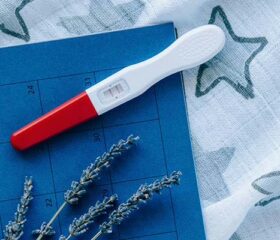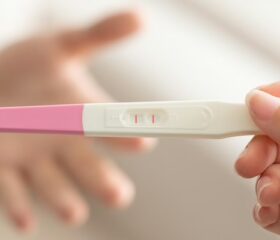How to Get Pregnant: Tips to Boost Fertility and Conceive Fast
Deciding that you want to add a new member to your family is the first step; the next is actually doing it.

- How long does it take to get pregnant naturally?
- What factors affect how quickly you can get pregnant?
- Ovulation: the precursor to pregnancy
- How to time sex for pregnancy success
- How to adjust your lifestyle to boost your fertility
- How men can improve their fertility
- Why a preconception appointment is helpful for getting pregnant
- Final thoughts
While some couples conceive quickly, for others, the journey to pregnancy takes a little longer and requires a bit more planning.
We’re here to give you insights and practical tips so you can have the best chances of getting pregnant, potentially even sooner than you think.
How long does it take to get pregnant naturally?
How long it takes to get pregnant varies from woman to woman, and it’s normal not to conceive straight away. Most healthy couples who are trying to conceive get pregnant within the first six months of trying, usually not immediately. 1
It’s worth noting that the longer you actively try to get pregnant, the better your chances of conceiving are, as shown in the table below: 2 3
| Time spent trying to conceive (TTC) | Chances of conception success |
|---|---|
| 1 month | 30% |
| 3 months | 60% |
| 6 months | 75% |
| 1 year | 90% |
| 2 years | 95% |
How long does it take to get pregnant when you’re older?
It gets much harder to conceive with age. Once you’re past the age of 30, your fertility begins declining, and this only intensifies when you get into your mid-30s. 4 That being said, plenty of couples in their mid to late 30s still naturally conceive.
The general recommendation is to speak to your doctor if you’re over 35 and have been trying to get pregnant without success for six months. If you’re over 40, you should get medical support even sooner.
How long does it take to get pregnant using in vitro fertilization?
If you’re using assisted reproductive technologies (ARTs), such as in vitro fertilization (IVF), you can expect the entire process to last around four to six weeks. 5 This includes the time spent stimulating your ovaries, collecting and fertilizing eggs, and then transporting them into your uterus.
Unfortunately, the success rate of IVF also declines as you get older, with those aged 35–37 having a 1 in 4 chance of getting pregnant, compared to the 1 in 3 chance for those under 35. 6
What factors affect how quickly you can get pregnant?
Outside of your age, there are other factors that affect how quickly you get pregnant. For starters, it stands to reason that the more you have sex, the more likely you are to get pregnant. But as well as how often you have sex, when you have sex is equally important. If you have sex around the time you ovulate, you’re far more likely to get pregnant.
Other important factors include:
- Your partner’s fertility
- Your lifestyle
- Whether you suffer from any underlying medical issues
We’ll explore these factors in more detail later on and learn how you can mitigate any issues that could be preventing you from getting pregnant easily.
Ovulation: the precursor to pregnancy
Pregnancy begins with ovulation, and if you want to get pregnant, knowing when you’re ovulating is essential.
Ovulation is the stage of your menstrual cycle when one of your ovarian follicles (small sacs in your ovaries that contain eggs) releases a mature egg. The egg then makes its way down one of your fallopian tubes, where it can be fertilized by sperm.
Around the time of ovulation, the lining of your uterus (the endometrium) thickens to prepare for a potential fertilized egg to implant. If the egg isn’t fertilized, this lining sheds during your menstrual period.
When does ovulation occur?
Ovulation usually happens around the halfway point of your menstrual cycle. If you have a regular 28-day cycle, you’ll usually ovulate around day 14.
If you’re trying to get pregnant with irregular periods, you may find it trickier to determine when you ovulate. This important event is quite brief, with an egg only viable (able to be fertilized by a sperm) for about 12–24 hours.
How long are you fertile for?
Despite ovulation lasting such a short time, your fertility window (the time when you’re most likely to conceive) includes:
- The 5 days leading up to ovulation
- The day you ovulate
- The day after ovulation
The reason is that sperm can survive inside your reproductive tract for up to 5 days. For the best chances of pregnancy success, you’ll want to time sex for this fertility window.
How do you know when you’re ovulating?
Knowing when you ovulate is an important step if you’re hoping to get pregnant quickly. There are a couple of ways you can figure out your fertile window:
Use ovulation tests
Many women use ovulation predictor kits (OPKs), also known as ovulation tests, to identify their fertile windows. These ovulation test strips look for luteinizing hormone (LH) in your urine. LH surges in your body around 16–36 hours before you ovulate, and you’ll have a good chance of getting pregnant after seeing a positive ovulation test result.
However, you may need to use ovulation tests over various cycles to get a better idea of what a positive test result looks like for you.
Use an ovulation calculator
An ovulation calculator predicts when you’re likely to ovulate based on the date of your last period. As mentioned, this usually happens around day 14 of a regular 28-day cycle, though some calculators can also account for slightly longer or shorter menstrual cycles.
But if you have erratic and irregular cycles, an ovulation calculator may not be the best method for you. Tracking ovulation with irregular periods is tricky with any method, so you’re best off speaking to your doctor.
Try other ovulation tracking methods
You can also use other methods to figure out when you’re ovulating, such as:
- Monitoring your cervical mucus: As you get closer to ovulation, you might notice that your cervical fluid changes in consistency. Many women say that the texture comes to resemble raw egg whites, which makes it more suitable for the sperm to survive.
- Charting your basal body temperature (BBT): Your BBT is your body’s resting temperature, usually when you first wake up in the morning. The idea with this method is that your BBT slightly rises when you ovulate. By tracking it with a basal thermometer over various cycles, you can identify patterns. Just keep in mind that the scientific evidence for BBT tracking is weak at best, so while this method may work for some, you shouldn’t rely on it.
- Looking out for other ovulation symptoms: Many women experience symptoms when they ovulate, such as abdominal pain (mittelschmerz), increased libido, bloating, and ovulation fatigue. However, since not all women get noticeable symptoms, this may not be the most reliable indicator.
If you’re struggling to identify your fertile window, speak to your doctor or a fertility specialist to get more personalized guidance.
How to time sex for pregnancy success
Once you know when you’re due to ovulate, the next step is to time sex accordingly. Aim to have sex daily or every two days during your fertile window.
Remember that sperm can survive inside your reproductive tract for up to 5 days, so having sex around this time will give you the best chances of success.
If you’re still not totally sure when you’re likely to ovulate, you can also simply have sex as much as possible after your period ends.
Are certain positions more conducive to pregnancy success?
You may have heard that certain sex positions make you more likely to conceive. It’s commonly claimed that the “missionary” or “doggy” positions are the best positions for getting pregnant. The idea is that these positions allow for deeper penetration, which brings the sperm as close to your uterus as possible. 7
While there’s very little scientific evidence to support the idea that any vaginally penetrative position is necessarily better, trying is harmless, so feel free to have sex in whatever position you prefer.
What to know about lubricants
If you and your sexual partner like using lubricant, make sure you opt for sperm-safe ones. Some lubricants contain spermicides that kill sperm. Always check the packaging to make sure your lubricant is “sperm-safe.”
How to adjust your lifestyle to boost your fertility
Beyond timing sex well, you can also significantly boost your chances of conceiving by making a few lifestyle adjustments.
Look after your body
Keep your body in tip-top condition to improve your overall fertility. First off, make sure you maintain a healthy weight, as being very overweight or underweight can throw off your natural hormonal balance and disrupt ovulation.
You should also:
- Exercise moderately: Your pre-pregnancy workout plan should include regular moderate exercise, which will improve your overall health and make your future pregnancy more comfortable. However, overly strenuous exercise (more than five hours a week of intense activity, especially if underweight) has been linked to decreased ovulation.
- Manage stress: While everyone has their own daily stresses, being chronically stressed can interfere with the hormones that regulate ovulation. Try to find ways to reduce stress in your daily life, whether it’s through yoga, meditation, or spending time in nature.
- Stay hydrated: Drinking plenty of water (around 8–10 cups a day) is crucial for your overall health and can help increase your production of fertile-quality cervical mucus.
If you’re having trouble implementing these changes to your lifestyle, don’t be shy about speaking to your doctor.
Eat well and take supplements
Your diet has a big role to play in your chances of conceiving, too. Include plenty of nutritious fertility-boosting foods in your diet, like fruits, vegetables, whole grains, and lean proteins.
Foods containing monounsaturated fats, like avocados, olive oil, or peanuts, could also improve your chances of conceiving.
Along with your diet, you should also start taking prenatal vitamins even before you get pregnant to put your body in the best position for pregnancy. Make sure you get a prenatal vitamin that includes: 8
- Folic acid
- Iron
- Calcium
- Vitamin D
While you can get plenty of nutrients from a healthy pre-pregnancy diet, the importance of prenatal vitamins can’t be overstated.
Cut out dangerous substances
Knowing what to avoid is just as important for conceiving. For starters, no amount of alcohol is safe during pregnancy, and it can also significantly decrease your chances of getting pregnant to begin with.
You’ll also need to avoid:
- Smoking: Smoking while trying to conceive is a big no-no. Not only does smoking tobacco greatly reduce your chances of conceiving, but it can also cause severe developmental issues in a fetus. You should plan to quit before you start trying to conceive. 9
- Toxins: Being exposed to toxins like pesticides, heavy metals, and lead could decrease your chances of conceiving and may also have devastating effects on a developing baby. If your job involves working with dangerous substances, speak with your boss to see if you can find alternative tasks.
- Excess caffeine: While you don’t have to completely cut out caffeine during pregnancy, excessive caffeine (i.e., over 300 mg or the equivalent of 1–2 cups of coffee a day) can make getting pregnant harder and may also cause problems for a developing fetus.
Review your medications
If you regularly take over-the-counter or prescription medications, be sure to review them with your doctor. Some common medications could inhibit your ability to conceive and are considered dangerous during pregnancy, including ibuprofen (Advil), some acne drugs, and many others.
Moreover, if you were previously using hormonal birth control for an extended period of time, you might have lower levels of certain B vitamins, so it’s a good idea to speak with your doctor if that’s the case, too.
How men can improve their fertility
It’s important to remember that male fertility is a huge factor in how successful you are at getting pregnant. In fact, in about 50% of cases of infertility, some condition on the man’s part is partially or solely responsible. 10
Fortunately, there are ways to improve a man’s sperm count and quality, such as:
- Maintaining a healthy weight: Being obese can negatively impact your sperm count and make it much harder to conceive, so chat with your doctor about maintaining a healthy weight. 11
- Keeping cool: Heat is harmful to sperm, so try to avoid hot tubs, prolonged hot showers, or tight-fitting and heat-trapping underwear.
- Eating healthily: Be sure to eat a diet that will keep your swimmers healthy. Eat plenty of fruits, vegetables, and legumes (beans) to improve sperm quality and mobility, and avoid ultra-processed foods. 12
- Limiting stress: Stress is also a significant factor for male fertility, so try to find ways to destress, whether it’s moderate exercise, meditation, or simply spending time in nature.
As with women, smoking and alcohol can both contribute to male infertility. If you want to get pregnant, both partners should cut these out completely. It’s also a good idea to schedule a checkup with the doctor before trying to conceive.
If you’re a man, a doctor can check your sperm count and health so you can rule out any potential fertility issues on your end.
It’s possible that cell phones could contribute to male infertility
Some studies have shown that mobile phone exposure can impact sperm mobility and viability. However, the exact role that phones play in male infertility is still up for debate.
Why a preconception appointment is helpful for getting pregnant
It’s recommended that you set up a preconception appointment about 3 months before you start trying to get pregnant. 13
During the appointment, your doctor will go over your medical history with you and check whether you have any pre-existing health conditions, such as polycystic ovary syndrome (PCOS), that could complicate a potential pregnancy or your chances of conceiving.
They’ll also go over the necessary lifestyle adjustments you’ll need to make and give you advice on how to implement them, as well as give you conception tips.
Final thoughts
Trying to get pregnant is full of ups and downs, and it may end up taking you longer than you expected. But each person’s body is different, and if you don’t get pregnant straight away, that doesn’t mean you won’t be able to at all.
By taking the right steps, looking after your body, and staying in close contact with your doctor, you’ll have far better chances of adding a tiny new member to your family.
Article Sources
- American College of Obstetricians and Gynecologists. "Trying to Get Pregnant? Here’s When to Have Sex" Retrieved August 6, 2025.
- The BMJ. "Extent of the problem" Retrieved August 6, 2025.
- UPMC HealthBeat. "How Long Does It Take To Get Pregnant?" Retrieved August 6, 2025.
- American College of Obstetricians and Gynecologists. "Having a Baby After Age 35: How Aging Affects Fertility and Pregnancy" Retrieved August 6, 2025.
- Cleveland Clinic. "IVF (In Vitro Fertilization)" Retrieved August 6, 2025.
- Tommy’s. "What is IVF? The process, risks, success rates and more" Retrieved August 6, 2025.
- Tommy’s. "What sexual positions are best for getting pregnant?" Retrieved August 6, 2025.
- Cleveland Clinic. "Prenatal Vitamins" Retrieved August 6, 2025.
- American Society for Reproductive Medicine. "Smoking and infertility" Retrieved August 6, 2025.
- StatPearls. "Male Infertility" Retrieved August 6, 2025.
- International Journal of Reproduction, Contraception, Obstetrics and Gynecology. "The role of obesity in male fertility" Retrieved August 6, 2025.
- The University of Chicago Medical Center. "Don't make the mistake of letting a diet kill sperm" Retrieved August 6, 2025.
- Johns Hopkins Medicine. "How to Prepare for Pregnancy" Retrieved August 6, 2025.







